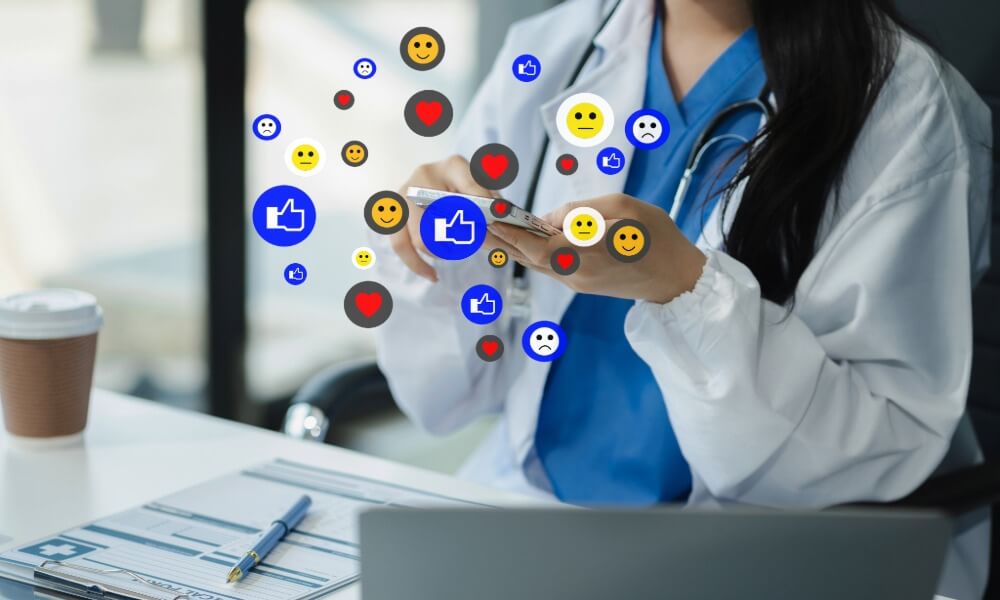Master healthcare social media marketing with AI-powered strategies that build professional authority while maintaining HIPAA compliance. Learn proven techniques for medical practice social media success.

Social media marketing in healthcare has evolved from optional to essential, with 76.1% of healthcare marketers increasing their social media investment and patients increasingly turning to social platforms for health information and provider research. However, healthcare social media marketing operates under unique constraints that require specialized strategies balancing professional authority building with strict privacy protection and regulatory compliance.
The integration of artificial intelligence into social media platforms has created new opportunities for healthcare practices to reach and engage patients more effectively while automating routine tasks and optimizing content performance. Yet these AI capabilities also introduce new compliance challenges and require careful implementation to maintain the trust and professionalism that healthcare relationships demand.
As someone who has helped hundreds of healthcare practices build successful social media strategies, I've learned that effective healthcare social media marketing requires a fundamentally different approach than other industries. The key lies in understanding that healthcare social media is not about selling products or services—it's about building trust, providing value, and establishing professional authority that naturally leads to patient acquisition and retention.
Healthcare social media marketing must navigate complex regulatory requirements that don't exist in other industries. HIPAA compliance, professional standards, and platform-specific policies create a framework that requires careful attention to content creation, patient interaction, and data management.
Patient privacy protection forms the foundation of healthcare social media compliance. Any content that could identify specific patients or reveal protected health information violates HIPAA requirements and can result in significant penalties. This includes avoiding patient photos without explicit written consent, refraining from discussing specific cases, and ensuring that all content maintains appropriate privacy boundaries.
Professional standards for healthcare providers extend beyond legal requirements to include ethical considerations about appropriate communication, advertising restrictions, and maintaining professional dignity in social media interactions. Medical professionals must balance accessibility and engagement with the gravitas that healthcare relationships require.
Platform privacy policies and data handling practices must be evaluated for HIPAA compliance, particularly when using social media management tools, analytics platforms, or advertising systems that may collect and process patient information. Healthcare practices must ensure that all social media tools and platforms meet appropriate privacy and security standards.
Content approval processes should be implemented to ensure that all social media content meets compliance requirements before publication. This includes medical accuracy review, privacy protection verification, and professional standards assessment for all posts and interactions.
Documentation and audit trails for social media activities help demonstrate compliance efforts and provide protection in the event of regulatory inquiries. Healthcare practices should maintain records of content approval processes, privacy protection measures, and staff training related to social media compliance.
Patient10x has developed comprehensive social media compliance protocols that enable healthcare practices to leverage social media effectively while maintaining full regulatory compliance and professional standards.
Artificial intelligence is transforming healthcare social media marketing by enabling more sophisticated content creation, optimization, and performance analysis while maintaining the accuracy and professionalism that healthcare content requires.
Automated content generation using AI can help healthcare practices create educational posts, health tips, and informational content at scale while maintaining medical accuracy and professional tone. However, all AI-generated content must be reviewed by qualified medical professionals to ensure accuracy and appropriateness.
Content optimization algorithms can analyze post performance, audience engagement patterns, and optimal posting times to maximize reach and engagement for healthcare social media content. This data-driven approach helps practices allocate their social media efforts more effectively.
Personalized content recommendations based on audience analysis can help healthcare practices create content that resonates with their specific patient populations while addressing common health concerns and questions in their community.
Automated scheduling and posting systems enable healthcare practices to maintain a consistent social media presence without overwhelming staff resources, while ensuring that content is published at optimal times for audience engagement.
Performance analytics and insights powered by AI can identify which types of content generate the most engagement, which topics resonate with audiences, and how social media efforts contribute to overall patient acquisition and practice growth.
Content compliance monitoring using AI can help identify potential privacy violations or inappropriate content before it's published, providing an additional layer of protection for healthcare practices using social media marketing.
Healthcare social media marketing should focus primarily on education and value creation rather than direct promotion, building professional authority that naturally leads to patient trust and acquisition.
Medical education content that explains common conditions, treatment options, and preventive care strategies positions healthcare providers as trusted experts while providing genuine value to social media audiences. This content should be accurate, accessible, and actionable for general audiences.
Myth-busting and misinformation correction content helps healthcare providers combat false health information while demonstrating their expertise and commitment to patient education. This type of content often generates high engagement while serving important public health purposes.
Seasonal health content addressing timely health concerns such as flu prevention, allergy management, or summer safety tips demonstrates proactive care and community awareness while providing relevant, valuable information to social media followers.
Behind-the-scenes content that shows practice operations, staff expertise, and facility capabilities helps humanize healthcare providers while building trust and familiarity with potential patients. This content must carefully avoid any patient privacy violations while showcasing practice strengths.
Community health initiatives and involvement demonstrate practice commitment to community wellbeing beyond individual patient care, building stronger emotional connections and local reputation that supports patient acquisition efforts.
Research and innovation sharing help healthcare practices showcase their commitment to staying current with medical advances while educating audiences about new treatment options and medical developments relevant to their specialties.
Patient10x offers specialized healthcare content creation services that help medical practices develop engaging, compliant social media content that builds authority and drives patient engagement.